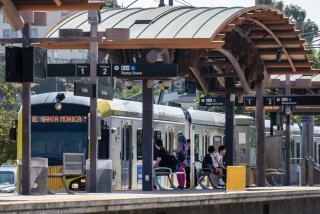Transit Agency Makes Loans Bank Rejected
County transit officials are lending $1.3 million to a prominent Wilshire district developer despite a bank’s refusal to issue the loans because of the borrower’s weak collateral, records and interviews show.
The loans are being issued by the Metropolitan Transportation Authority to two investment groups managed and partially owned by Wayne Ratkovich, proprietor of the Wiltern Theatre and an adjacent complex of office and retail space.
A bank had previously rejected the loans to Ratkovich, which were to carry below-market interest rates and other favorable repayment terms. The loans would have been the first under a new MTA program designed to help businesses harmed by expansion of the Red Line subway.
After Ratkovich threatened to sue the MTA over the rejection, transit commissioners approved separate loans of $1 million and $300,000 to his partnerships two weeks ago at a meeting that was closed to the public.
The $300,000 loan is not secured by any asset. Records show that the $1-million loan is secured by the Ratkovich-managed Wiltern Theatre and adjoining offices and shops already pledged as collateral for two private loans totaling $15 million.
Officials said Monday that the MTA only recently began an appraisal of the real estate that secures the $1-million loan, which is expected to be issued within days.
The chairman of the MTA defended the loans, saying county lawyers had warned that Ratkovich had strong grounds for a lawsuit because the commission’s staff had delayed establishing a loan program.
“This was a special circumstance,” said Chairman Richard Alatorre, a Los Angeles city councilman.
Lawyers for the MTA, however, did not obtain a pledge from Ratkovich not to sue, agency spokeswoman Stephanie Brady confirmed.
Under the program, the MTA would guarantee loans administered by commercial banks. East-West Federal Bank, which is administering the program, rejected the applications from Ratkovich after reviewing the property’s existing loan encumbrances and the diminished cash flow of the Wiltern complex.
An executive of the San Marino-based bank informed the MTA’s treasury department of the rejection in a letter June 11--five days before transit commissioners voted to lend public funds directly to the Ratkovich partnerships.
Bank Vice President Derald D. Borup also noted that no appraisal had been performed on the real estate offered as collateral. He wrote that “any appraiser would be hard-pressed” to reach an asset value that would justify an additional $1-million loan.
The loans were approved June 16 by a 9-0 vote, with four MTA members abstaining.
“Mine was a concern that this was moving rather swiftly and rather forcefully,” said Los Angeles City Councilman Mark Ridley-Thomas, who abstained. Questions about the loan collateral and other factors, Ridley-Thomas said, “caused me to be concerned.”
According to Alatorre and others, the commitment to launch the loan program was a direct response last October to Ratkovich, who said the Wiltern investments were being severely damaged by underground tunneling and street congestion.
“The staff dropped the ball,” Alatorre said, noting that MTA staff had failed to follow through on assurances made to Ratkovich that the loan program would be organized by January.
Alatorre said he was confident that the loans will be repaid because Ratkovich “has been a leading citizen here in Los Angeles and in the forefront of restoring” historically significant urban architecture. “He’s not going anywhere,” the councilman added.
Alatorre also said he was influenced by Ratkovich’s statement to him that the Wiltern investments--centered at the southeast corner of Wilshire Boulevard and Western Avenue--faced bankruptcy if the loans were not approved.
Ratkovich declined to discuss the subject of bankruptcy but said that the recession, the spring, 1992, rioting and the ongoing subway work have severely hurt business.
“This is the last (major) building left in the neighborhood that has some hope for the future,” Ratkovich said, noting that the nearby Bullock’s Wilshire has gone under.
In addition to calling on Alatorre, Ratkovich said that he contacted county Supervisor Mike Antonovich, who also serves on the MTA. Antonovich could not be reached for comment. His spokesman said that the supervisor supported the loans and that “there was no excuse” for the delay in launching the program.
The $1-million loan is going to Wiltern Associates, the Ratkovich-controlled partnership that owns the real estate. The $300,000 loan has been delivered to the Ratkovich Co., which manages the properties. Both loans are repayable in seven years at an interest rate of 5.25%. Ratkovich said that he has agreed, reluctantly, to allow up to $30,000 of the loan proceeds to pay for the recently begun property appraisal.
L. A. (Kim) Kimball, the MTA’s deputy chief executive officer, said that the loan program was envisioned as a way to help property owners and merchants “facing loss of business revenue.” He confirmed that approval for the loans was rushed because of Ratkovich’s threat to sue.
Kimball said discussion of the loans in closed session was proper because of the litigation threat. The matter was not listed on the MTA’s public agenda.
As of Monday, Kimball said, no other businesses had applied for the loans, which are to be issued at an interest rate of no more than 2% above the prime lending rate. A total of $5 million would be available for lending this year, he said.
Ratkovich, who briefly oversaw restoration of the Los Angeles Coliseum, contributed $8,350 over the last nine years to elected officials serving on the MTA, including $500 to Antonovich in 1986. He donated $3,250 to Mayor Tom Bradley, who did not vote on the loans, and $3,100 to Supervisor Gloria Molina, whose alternate abstained.
More to Read
Sign up for Essential California
The most important California stories and recommendations in your inbox every morning.
You may occasionally receive promotional content from the Los Angeles Times.











